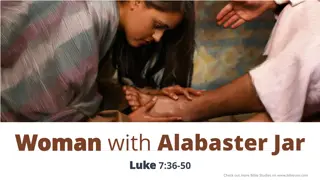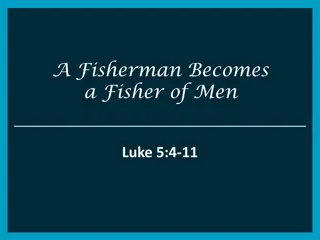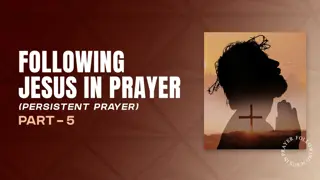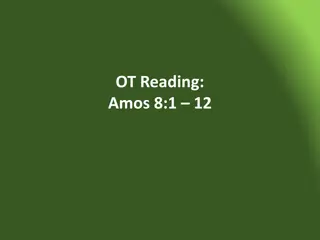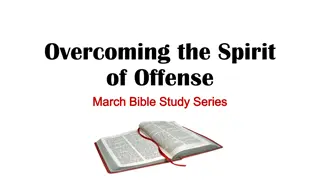Understanding the Story of Love in Luke 7:36-50
In Luke 7:36-50, a Pharisee invites Jesus to dine at his house, where a woman known as a sinner enters and displays an overwhelming act of love by anointing Jesus' feet with expensive perfume and tears. Despite the Pharisee's judgment, Jesus teaches a powerful lesson in forgiveness and love through this encounter.
Download Presentation

Please find below an Image/Link to download the presentation.
The content on the website is provided AS IS for your information and personal use only. It may not be sold, licensed, or shared on other websites without obtaining consent from the author. Download presentation by click this link. If you encounter any issues during the download, it is possible that the publisher has removed the file from their server.
E N D
Presentation Transcript
What Magnitude of Love! Luke 7:36-50 A. Invited to dine at the house of a Pharisee (Lk. 7:36-39). B. Parable of debtors (Lk. 7:40-47) C. Response to Jesus parable (Lk. 7:48-50)
A. Invited to dine at the house of a Pharisee (Lk. 7:36-39) 1. (Vs. 36) Because the term Pharisee appears 27 times in Luke s gospel (28 KJV 1 added in Lk. 11:44), and all uses of the term are negative, we have a pretty good feel for what kind of people are referred to by it, people who are fundamentally opposed to the Lord Jesus Christ. In fact, No people were more proud, exclusive, and self- righteous than the Pharisees, this occurrence is no exception. Even what appears to be a generous offer to dine here is turned into something a bit sinister. Jesus accepted this offer to dine in the Pharisee s house and reclined at the table. Phillips says, On such occasions, the various ones present reclined on couches arranged
1. (cont.) around the table. Each one rested his left elbow on the table with his feet pointed away toward the wall. 2. (vs. 37) And there was a woman in the city who was a sinner; and when she learned that He was reclining at the table in the Pharisee s house, she brought an alabaster vial of perfume. Her presence was not unusual for when a Rabbi was invited to someone s house others could stop by and listen to the conversation. At the same time a sinner, that is, a prostitute would not have been very welcome in Simon s house, so it took courage to come (TNTC Morris). He adds that, We may fairly deduce that this perfume was costly. Jewish ladies commonly wore a perfume flask suspended from a cord round the
2. (cont.) neck, and it was so much a part of them that they were allowed to wear it on the sabbath The extensive use of perfumes may be gathered from the fact that the Sages allotted a certain woman an allowance of 400 gold coins for perfume (Ketuboth 66b; even at that she was dissatisfied!) what is meant is perfumed oil, not a solid. Such oils were common accompaniments of festive occasions. The word alabastros denoted a globular container for perfumes. It had no handles and was furnished with a long neck which was broken off when the contents were needed. 3. (vs. 38) The text continues; and standing behind Him at His feet, weeping, she began to wet His feet with her tears,
3. (cont.) and kept wiping them with the hair of her head, and kissing His feet and anointing them with the perfume. Morris continues, People reclined on low couches at festive meals, leaning on the left arm with the head towards the table and the body stretched away from it. The sandals were removed before reclining. The woman was thus able to approach Jesus feet without difficulty. She may have intended to anoint them (or the head), but her emotions got the better of her and her tears fell on his feet. She promptly wiped them with her hair, a significant action, for Jewish ladies did not unbind their hair in public. Clearly she was completely oblivious of public opinion in the grip of her deep emotion. This will explain
3. (cont.) also her kissing of the feet. Finally she anointed Jesus feet with the unguent. Normally this would have been poured on the head. To use it on the feet is probably a mark of humility. To attend to the feet was a menial task, one assigned to a slave. It is a fair conjecture that Jesus had turned this woman from her sinful ways and that all this was the expression of her love and gratitude. It is not clear whether she had met Jesus. She may simply have been among the crowds who listened to his teaching and had been so convicted that her life had been changed. Or she may have had unrecorded contacts with Jesus. We do not know. 4. (vs. 39) Here the evil heart of this critical, judgmental
4. (cont.) Pharisee could no longer be without inner, silent expression: Now when the Pharisee who had invited Him saw this, he said to himself, If this man were a prophet He would know who and what sort of person this woman is who is touching Him, that she is a sinner. Phillips says, Simon was outraged. He held his tongue, but the Lord read his thoughts: he spoke within himself, saying, This man, if he were a prophet, would have known who and what manner of woman this is that touches him: for she is a sinner (Lk. 7:39). He seems to have derived a sardonic satisfaction from it. It exposed Jesus as a fraud, or so it seemed to him. He had plenty of friends who would be pleased with him for exposing this would-be prophet.
B. Parable of debtors (Lk. 7:40-47) 1. (vs. 40) The Pharisee had said nothing and, Little did the man know that the Lord was about to expose him. Notice that Jesus knew his name and used it in this personal address. And Jesus answered him, Simon, I have something to say to you. And he replied, Say it, Teacher. It appears that the Pharisee is extremely confident in his ability to respond to whatever Jesus says. This Simon was one of nine different ones in the NT. In addition to the one here, we have Simon Peter (Mt. 4:18); Simon the Zealot, another of the twelve (Mt. 10:4), Simon, a brother of Jesus (Mt. 13:55), Simon the Cyrene, pressed into service to carry the cross (Mt. 27:32), Simon, the
1. (cont.) father of Judas Iscariot (Jn. 6:71), Simon the leper, owner of a house in Bethany on the Mount of Olives (Mt. 26:6), Simon the tanner in Joppa (Ac. 9:43), Simon the magician (Ac. 8:9). 2. (vv. 41-42) Jesus began His parable, A moneylender had two debtors: one owed five hundred denarii, and the other fifty. When they were unable to repay, he graciously forgave them both. So which of them will love him more? A denarii was equal to a day s wage. So one owed 500 days pay, the other 50 days pay. Assuming that one s annual income is $75,000, that would be $102,739.72 over 500 days. It would be approx. $10,273.97 for the one who owed the debtor fifty denarii.
2. (cont.) Neither compares to the vast number forgiven the man who owed approx. $11,250,000,000 (Mt. 18:24). He in turn refused to forgive a man who owed him a hundred denarii (Mt. 18:28). Here Jesus simple question to Simon the Pharisee regarding the two forgiven debtors was, So which of them will love him more? 3. (vs. 43) One would have thought the answer would have been obvious. But Simon seems to have trouble coughing up the answer, which was correct but given, somewhat grudging(ly), with his I suppose the one who was forgiven more. Jesus allowed that he was correct: You have judged correctly.
4. (vs. 44) Turning toward the woman, He said to Simon, Do you see this woman? I entered your house; you gave Me no water for My feet, but she has wet My feet with her tears and wiped them with her hair. Jesus asked a good question. Did Simon see this woman ? Did he see her for who she really was or merely as a godless wretch (in his rather arrogant opinion)? Simon was blind to any moral or spiritual change in the woman, although it was evident had he cared to look carefully. Simon had not even allowed Jesus the common courtesies of the day. Jesus said, you gave Me no water for My feet, but the woman on the other hand, Jesus said, has wet My feet with her tears and wiped them with her hair, a very humble service by her.
5. (vs. 45) Further neglect of common decencies on Simons part are marked by contrasts: You gave Me no kiss; but she, since the time I came in, has not ceased to kiss My feet. In keeping with ancient near eastern culture, GNTC says, Simon did not give Jesus the usual courteous kiss, while the woman went beyond the customary and had not ceased to kiss His feet from the time He entered. Her kisses were simply an expression of a heart filled with thanksgiving and love. 6. (vs. 46) Jesus said, You did not anoint My head with oil, but she anointed My feet with perfume. Common oil, probably olive oil, was not very expensive; there is a contrast with ointment, which was (a) rare and expensive
6. (cont.) perfume. It is myrrh in the Greek, from the plant Commiphora myrrha, which is native to southern Arabia and northern Somaliland. The residue secretes from the tree (or is exuded artificially) and can be used in its liquid state as an oil; it can also be hardened into a resin for incense. To use such an expensive perfume on anyone s feet was simply extraordinary. But it was not too great a sacrifice for Jesus feet, by no means! 7. (vs. 47) Jesus does not discount the magnitude of her sins. He addressed them head-on: For this reason I say to you, her sins, which are many, have been forgiven, for she loved much. Her sins many, or a few, have been forgiven ( aphi mi to dismiss or release ). Her sins
7. (cont.) were not forgiven because she loved much; rather she loved much because her sins were forgiven. This is as the final statement here makes plain: but he who is forgiven little, loves little. This was the premise of Jesus discussion in vv. 40-43. The magnitude of one s love is in direct proportion to the magnitude of one s sins forgiven. It is also possible that this implies that Simon was a believer also, but that he loved less because he literally had been forgiven less.
C. Response to Jesus parable (Lk. 7:48-50) 1. (vs. 48) Jesus had turned toward the woman in vs. 44a. Apparently, she remained His focus, so now He said to her, Your sins have been forgiven. I think she already knew that, thus the expression of her love in the previous verses. I think He said it out loud for the benefit of the other guests in the house. 2. (vs. 49) So they responded, perhaps silently or maybe as a discussion among themselves: Those who were reclining at the table with Him began to say to themselves, Who is this man who even forgives sins? Were they unaware of the healing of the paralytic let down through the tiles when Jesus seeing their faith said, Friend, your sins are
2. (cont.) forgiven you (cf. Lk. 5:20-26). There He proved that He had the power on earth to forgive sins by healing the man. That power remained. But here, Jesus does not seem to pay any attention to the question. They should research the previous incident at which He proved His power to forgive sins. 3. (vs. 50) Jesus retains His focus on this woman to whom He said, Your faith has saved you; go in peace. The principle of justification by faith is taught here as in the whole Bible. Rm. 5:1 says, Therefore, having been justified by faith, we have peace with God through our Lord Jesus Christ. That is positional peace, but Jesus is probably ref. to experiential peace here (cf. Phil. 4:7).






